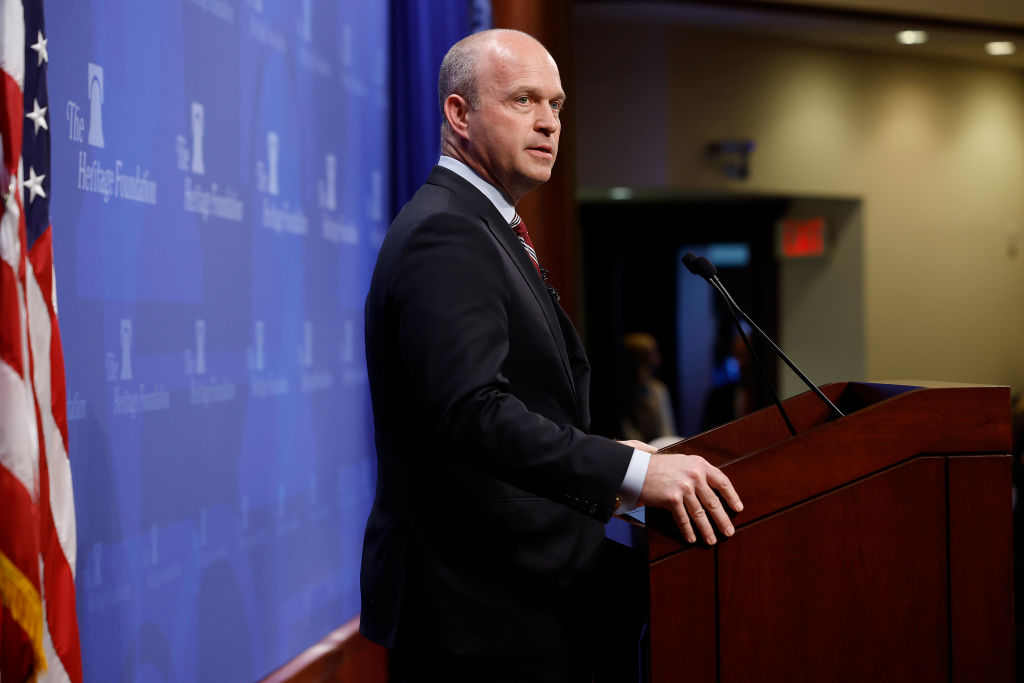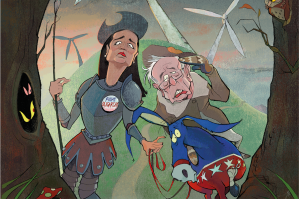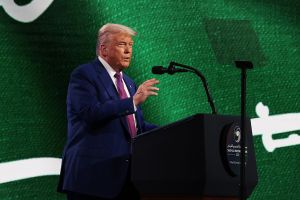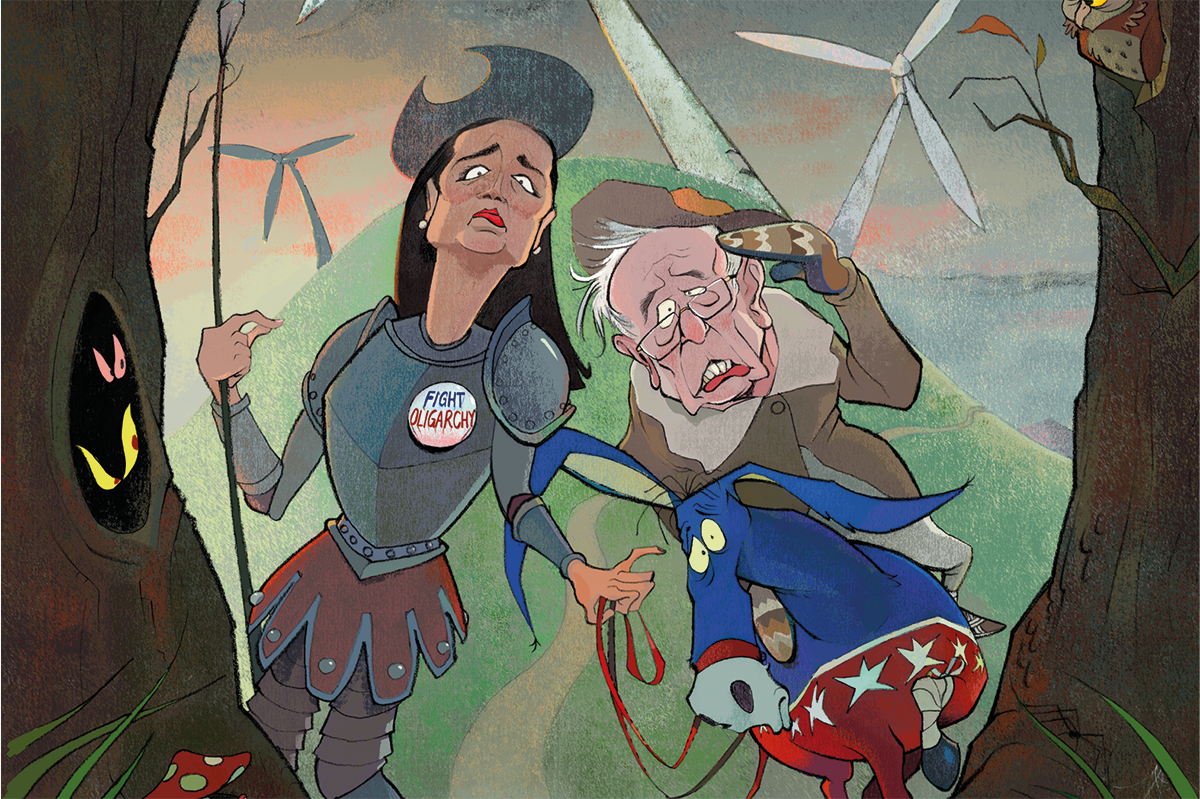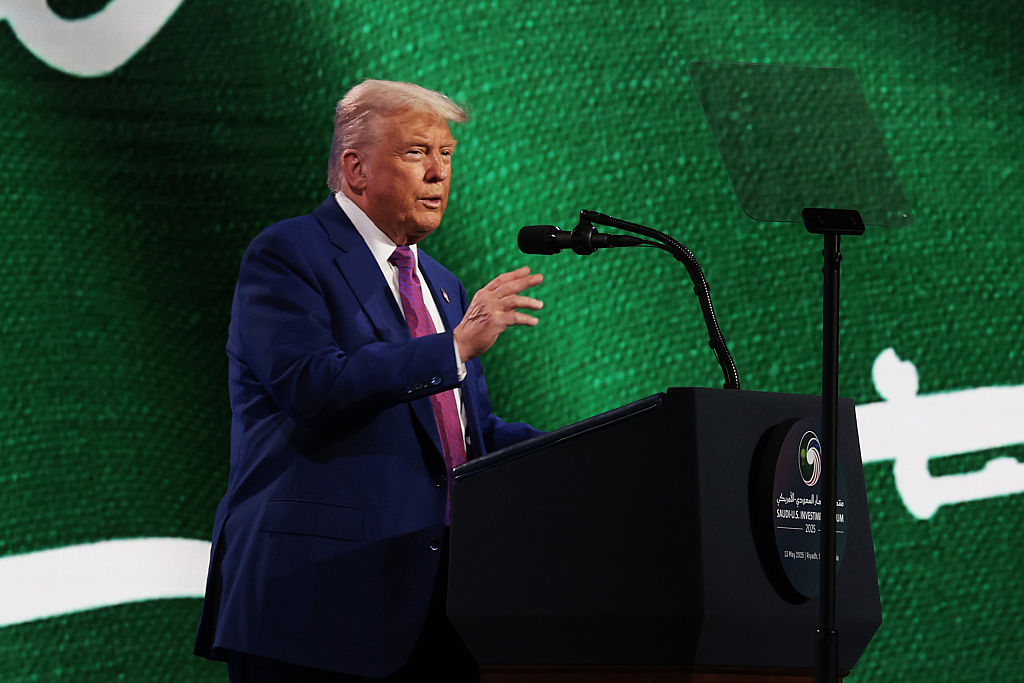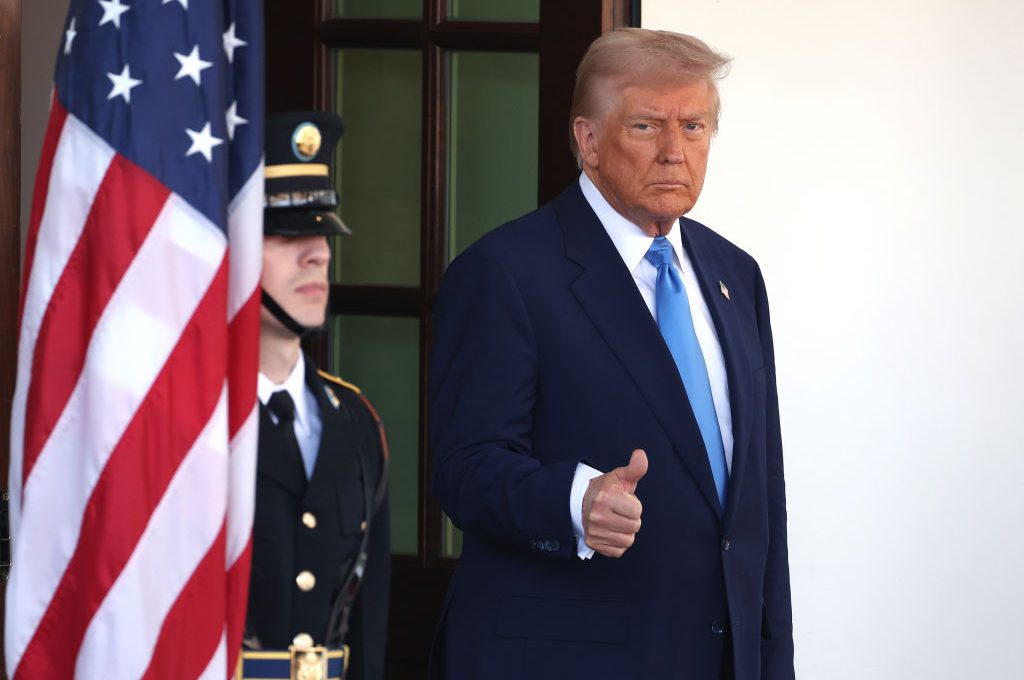Last September I was sitting in the crowd at the annual National Conservatism Conference, lamenting the fact that my hotel room had no hot water, when Dr. Kevin Roberts, the president of the Heritage Foundation, took the stage at Miami’s JW Marriott for his plenary address.
Nationalists and populists at the conference were suspicious of Dr. Roberts’s presence. The “New Right” had spent the past few years accusing the right-wing establishment, including the cache of center-right DC-based think tanks like Heritage, of selling out ordinary Americans for profit and influence. These think tanks were too focused on writing whitepapers, was their charge, and didn’t understand what had happened to the country: a working class has been economically hollowed out by free trade, unfettered immigration and automation, and culturally alienated by a monolithically liberal elite.
But with just one statement, Roberts put the crowd at ease: “I come not to invite national conservatives to join our conservative movement, but to acknowledge the plain truth that Heritage is already part of yours.”
Roberts was not conceding that Heritage, which he had been appointed to run a year earlier, had abandoned its longstanding commitment to free markets and limited government in order to find a new home with the populist right. In fact, as he explained in a recent phone interview, he and Heritage remain “skeptical” of “the political right getting much more engagement with unions,” something many on that end of the spectrum argue for. In Miami, Roberts was trying to explain to the NatCon crowd — and the conservative movement more broadly — that he wants the Heritage Foundation to be the organization that brings together disparate factions on the right into one powerful entity that can beat back the left.
“Heritage is reminding everyone of our kind of informal mantra, which is to add and multiply,” Roberts told me, adding that any perceived inconsistencies between Heritage now and its Reaganite roots are “a reflection of adapting to the political circumstances around us.”
As the uber-online might say, Roberts understands the moment. Of course, not everyone is buying in. There are plenty of populists who feel that Heritage’s shift is a disingenuous ploy. And there are many more establishment conservatives who lament what they see as Heritage’s drift away from its founding principles. The fact that the Heritage board is letting Roberts play political peacemaker with the New Right signals that the think tank is hungry for relevance again — and is willing to be a bit less rigid in pursuit of that goal.
Heritage had struggled to regain trust in the conservative movement for several years after it pushed out its president, former senator Jim DeMint, in 2017. The Heritage board became convinced DeMint was too political for the role, in part because he was on good terms with the populist then-president, Donald Trump, and helped staff his administration. Another charge was that DeMint had abandoned Heritage’s intellectual and academic tradition. After his dismissal, numerous members of Congress said they would no longer work with Heritage since it had knifed their old friend.
Ed Feulner, a founding trustee of Heritage and its president from 1977 to 2013, served as interim president after DeMint left, until the board appointed Kay Coles James to the role in 2018. James was a relatively uncontroversial but uninspiring leader who had helped lead the Trump transition team and was supportive of the president’s “urban agenda,” but also spoke critically of some of his rhetoric. (At a Heritage Christmas party for the media during her tenure, James pointedly told the press that, unlike others, she did not believe they were “fake news.”) James stepped down from her position in October 2021 and joined newly elected Virginia governor Glenn Youngkin’s office.
That’s when Roberts took the reins. So far, he seems genuine in his attempts to build a new conservative coalition. The so-called “cowboy Catholic” says that his upbringing in southern Louisiana taught him about the importance of the working class, as well as how to suss out false friends — a useful skill in Washington.
“I’ve learned from experience doing a bunch of different things in my career that any time someone thinks that you or your organization or company are being disingenuous, there’s nothing you can say that will persuade them otherwise. And so the only retort I have to people who are making that [charge] is that time will tell,” he declared.
I asked Roberts point blank about the perception that Heritage was washed up, that it had become irrelevant and was no longer trusted to address the concerns of everyday Americans. He was not offended by my characterization and acknowledged that the perception presents a real challenge to rebuilding the organization’s legitimacy.
“That’s why I took the job,” he told me. “As a movement conservative, I heard those things too. I kept those thoughts to myself because I love Heritage. A lot of those constructively critical comments come from great love for the institution. To some extent, I think it was true not just for Heritage, but for all of the legacy think tanks.
“We really did want to rejuvenate Heritage in the spirit of service to the movement,” he added.
Roberts made clear when he was chosen that he wanted to be the leader who would strike the right balance between Heritage’s rich history of deep academic research and political lobbying.
“A think tank, at its best, doesn’t merely leave its thinking on paper,” Roberts told RealClearPolitics when his appointment was announced.
In pursuit of his goal of widening Heritage’s tent, Roberts rekindled some old friendships. Heritage now routinely sponsors events with the Conservative Partnership Institute, the DeMint-founded nonprofit that trains and places congressional staffers. Roberts joined Oren Cass, the founder of American Compass — a New Right think tank — for a public discussion about the future of conservatism. On his podcast, The Kevin Roberts Show, Roberts’s guests have spanned the right’s ideological gamut.
Naturally, Heritage’s willingness to overlap with conservative populists has made the organization some new enemies. A chorus of neoconservatives and “classical liberals” are lobbing the same insults at Roberts that were once thrown DeMint’s way. Jonah Goldberg accused Roberts of ushering in “Old World conservatism” at Heritage. A report from Goldberg’s media outlet, the Dispatch, asserted that “Heritage has transitioned from being the home of conservative intellectuals to an institution that forces its thinkers to take a backseat to the base.” The primary complaint addressed in the article was that Heritage should not have opposed a $40 billion supplemental aid package to Ukraine, a decision that led some members of its foreign policy team to jump ship to other think tanks.
“I will say on neoconservatism, it is our desire to eliminate most of that strain of thought from the conservative movement. Not the people,” Roberts said. “We’re hopeful that we’re persuasive on our third way of foreign policy.”
This “third way” refers to Heritage’s novel approach to foreign conflicts: as Roberts describes it, “neither interventionism nor isolationism.” Critics suggest this is a massive departure from Heritage’s foreign policy tradition. Sort of. The organization’s experts may have defended the “just” Iraq War, but by 2013 they were warning against an unwinnable military intervention in Syria, long before Roberts took over.
A week before I spoke to Roberts, the Heritage Foundation celebrated its fiftieth anniversary at the Gaylord Hotel in National Harbor, Maryland. There were 2,300 people at the closing Friday night dinner, which boasted a keynote speech from Tucker Carlson — just a few days before he got the boot from Fox — and a surprise musical performance by country musician Dierks Bentley. The prior week, Heritage hosted former British prime minister Liz Truss to give its 2023 Margaret Thatcher Freedom Lecture.
Alongside these events, Heritage was sponsoring a leadership summit hosted by the Bull Moose Project, a New Right training organization for young political candidates led by Aiden Buzzetti, Ziven Havens and David Carlson. Speakers included West Virginia treasurer Riley Moore, the Center for Immigration Studies’s Mark Krikorian, and 1776 Project PAC founder Ryan Girdusky. Again, Heritage took heat from neoconservatives and NeverTrumpers online who accused them of abandoning their policy tradition.
“Heritage seems to be unable to make up its mind about what side of the conservative spectrum they are on. Truss is a staunch free-marketer and limited government conservative yet they invite the Bull Moose Project as well as Viktor Orbán to talk as well?” a self-proclaimed neoconservative quipped on Twitter.
“Unfortunately, you can’t make everyone happy,” Roberts said in response to the recent criticism. “It would be nice if we could.”
“I don’t mean this dismissively toward our critics, but I don’t care about the criticism,” he continued. “Of the 2,300 people who were at the Friday night event with Tucker, there were probably some there wondering, ‘Why Tucker?’ And then what happened by the end of the night?”
What happened was that Carlson received a standing ovation and everyone I spoke to at the dinner thought it was one of the most important speeches they had ever heard. During the speech, Carlson asserted that it’s “obvious” that many of our current political battles are not about partisanship but about good versus evil. It reportedly rankled his then-boss, Rupert Murdoch, but inspired Roberts, who told the American Conservative that “the Holy Spirit was clearly present Friday night in Tucker’s comments, and it was profound.”
While various factions on the right take potshots at Roberts’s political maneuvers, Heritage is busy embarking on one of its most ambitious projects ever. Project 2025, which Heritage is working on in concert with fifty-five other conservative groups, is building up a database of vetted conservatives to help staff the next presidential administration.
“Every time Heritage is at an event, which is every day, practically, around the country, we’re asking people to submit their names. I know our other coalition partners are doing the same,” Roberts said. “We’re all checking at the door our organizational self-interest.”
There will be plenty more nitpicking about Heritage’s new flexibility, but there is no question that they’re a serious part of the conversation again.
This article is taken from The Spectator’s June 2023 World edition.



